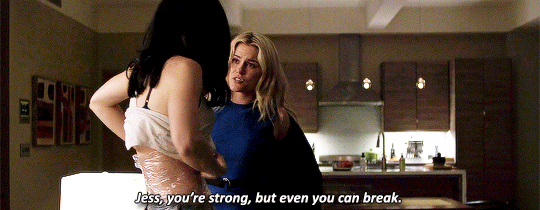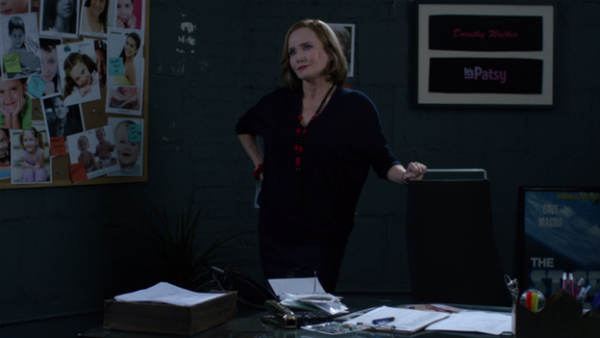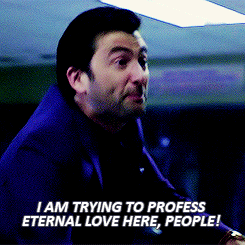Trigger warning for discussion of rape, sexual abuse, and child abuse.
So here I am after five months of exploring the Marvel Cinematic Universe, back at the point that started it all. Jessica Jones, the show that made me think this franchise might be worth a try.
I will say it right off the bat: I love this show. I think it’s as close to perfect as any show I’ve ever seen has been. The writing, acting, directing, and music all came together to make something intelligent, meaningful, important, and just… good. This is exactly what I mean when I say that I like grimdark done well. Because this is dark, about as dark as you can get really, but it still manages to fill me with positive feelings.
All I can really do is go through all the elements that this show got right—elements many shows and films don’t—and try to explain how and why this was achieved. Inevitable, some things will be a matter of subjective emotion and the way that I personally relate to the material, but I must say, I’m quite confident in this narrative’s ability to stand up to anyone’s viewing.
Jessica Jones and the Reluctant Hero
Jessica Jones, the eponymous protagonist of the series, is in many ways a very conventional noir anti-hero. She’s dark and brooding, she’s an alcoholic, she pushes people away because she’s “dangerous to be around” but, damn it, her heart of gold gets in the way of her badassitude.
What makes her different, and what makes her a positive example of this trope, is that, firstly, she’s a woman. And women filling the roles of male archetypes is still something worthy of comment. Secondly, this is also an archetype that is very thoroughly explored and deconstructed.
Jessica’s physical and professional abilities are contrasted with her emotional and mental vulnerability. Her dark brooding ways are not presented as a source of strength—quite the opposite. Nor is her desire to protect people with emotional distancing portrayed as noble.

In fact, her heroism is always tied to her willingness to engage with others, and to ask her help particularly. Her real hero status comes from a determination to help the people she feels deep empathy with, and this determination, in turn, seems to bring out the best in them. Her determination to build up walls doesn’t stop her from doing good, and in turn it doesn’t stop others from caring.
I appreciate this especially because of the tendency in the MCU to glorify rugged individualism and portray people in authority as somehow… I don’t even know; not evil exactly, but certainly an obstacle that a “real hero” has to constantly overcome. People in this show mostly want to do the right thing.
Except for Kilgrave… but more on that soon.
Jessica Jones, sexual assault, and trauma
We’ve been using this show as an example of how sexual assault and its implications can be explored in media without being exploitative or fetishistic.
The two things that were key to this was the explicit exploration of the issue of positive consent, and the fact that the narrative was very careful not to fall into the trap of “Rape is Empowering.” Jessica is not broken by her sexual assault, but it certainly didn’t make her stronger. The juxtaposition of that strength with that trauma is very important too.

Jessica’s super powers couldn’t protect her from her abuse, neither could her strength of character. Because people aren’t abused because of anything they do, they’re abused because an abuser abused them. It’s something that always happens at the abuser’s whim.
Kilgrave and his terrifying mind control powers are perhaps the best personification of this concept possible. No one is safe from him. It doesn’t matter how seemingly strong or even powerful you are, he can still get you.
And the discussion of rape that “doesn’t look like rape” is just depressingly necessary.



I also really liked how women being told to “smile” is constantly used to make the same point—how woman constantly being given the message that they should look and act a certain way for the benefit of men goes hand-in-hand with the notion that they must be happy to have sex with you if you buy them a nice dinner.
Jessica Jones and the Victim Blaming
A large part of Jessica’s motivation in this series is about her trying to atone for her actions when she had been under Kilgraves control. She feels responsible for killing Reva, and she feels responsible for the fact that Kilgrave is leaving a trail of destruction just to mess with her.
This is despite the multiple times she told other victims that it wasn’t their fault, they weren’t responsible.
The world at large holds the victims responsible as well, from Hope Schlockman rotting in jail, to the wonderfulness that is the support group.
The support group, and really the character of Malcolm (who the group is an extension of in many ways), grapples with this. Malcolm asks if he was only capable of the horrible things he did because it was somewhere inside him all along, and what it means for his conception of himself going forward.

But then the narrative decides to muddy these waters with the character of Hogarth. She tried to harness the force of nature that is Kilgrave for her own (not exactly noble) purposes and ended being hoisted by her own petard for it. She’s clearly victimized by Kilgrave (he tried to kill her, after all) but she’s also clearly in some measure responsible for the situation she finds herself in.
I’m not criticizing the narrative for this, in fact I will defend Hogarth’s characterization and arc, but it goes to show that this is a story that sometimes these moral questions are not as straight forwards are we would like them to be, and perhaps we shouldn’t pretend they are.

Jessica Jones Never Says “I Love You”
There are two relationships in the season that are important to Jessica. One of them is platonic (familial even) and the other is romantic.
Jessica’s relationship with her adoptive sister Trish is by far the most interesting to me. (I realize that some people ship them. And while I always do my best not to ship-shame, I really can’t see this as anything but missing the point.)
Familial love is unconditional love and when the object of said love is Jessica Jones, the unconditional part is rather necessary. But Trish’s constant support, her determination to not be a burden on anyone with her badass Krav Maga skills, is what we all need, but none of us deserve.

That’s not to say that Trish is perfect, of course, her “wanting to help” doesn’t always make the situation better, but accepting that help is Jessica’s greatest source of strength. And it’s hardly one sided; Jessica has been making Trish strong since they were teenagers trying to survive an abusive parent together.
Then there is Luke Cage. This certainly is romantic, but it’s not unconditional. And there are few instances where “overwhelming guilt that I involuntarily murdered your wife” is a solid foundation for a relationship. Her unwillingness, or inability, to communicate with him meant that they never really had a chance.
But what I really like about their relationship, other than the puddle of goo Jessica turns to at the sight of him… me too dude… is that, like, what even are gender roles? And it’s not that she can hold her own beside him physically, that’s a rather superficial manifestation of this.

I’ll talk a little more about this below, but this relationship just entirely throws out protective paternalism, and I love it.
Jessica Jones and the Many Faces of Dysfunction
It’s not just the protagonists two most important relationships that are explored in this narrative. I’m actually rather amazed at the scope of relationships covered. There’s Malcolm and his almost reluctant friendship with Robyn, where they bond over their inability to let go of the people they love.
And, of course, there’s Robyn and her brother Reuben… I mean, speaking of dysfunction. And also infantilization.

While Luke Cage may not be into protective paternalism, Will Simpson most certainly is, and also mansplaing. The narrative is aware of this, which makes it more hilarious than annoying.

Trish kind of gets the short straw when it comes to bad relationships though, because her mother is a piece of work. Like, a “forced her to vomit whenever she ate pizza” kind of piece of work. This relationship is another example of how well this show deals with abuse and its aftermath. (Notice how it’s almost all aftermath.., like, we don’t have to see a woman be raped to know that rape is bad *cough, cough*) The narrative assertively gives Trish the right to not forgive her mother, even when she passive-aggressively asks for it. Kind of. In a manipulative way.
She had sad eyes. But Trish didn’t care. Nor should she.
Then there is Hogarth. Just… Hogarth. The story of the high-powered lawyer who’s leaving their wife for the younger, cleavage baring secretary is perhaps not in anyway original, (although, like having a woman as a noir protagonist, having this perfectly conventional story with gay characters is still worthy of comment) but it really drove home this idea that no one goes through situations like that looking good.
Jessica Jones and the Graveyard of Tropes
No, seriously, how many tropes did this show slay in its first season? Shall we list them?
Toxic Masculinity: Will Simpson basically is the bloated corpse of this trope. He tries to be a manly man, and the narrative shuts him down every time. I love it.

Closer to Earth – Women are more nurturing: Yeah, I’m not sure how much of an explanation this needs. Like, just juxtapose Jessica and Malcolm.

Closer to Earth – Gays so Special: It’s still so tempting to put homosexual relationships on a pedestal. And this is very understandable, given media’s fondness for Bury Your Gays and other lovely tropes. But really, failed romantic relationships are just part of normal human behaviour. Gay people should be able to have their messy, unamicable divorces without it somehow being an indictment of all homosexual relationships ever.
All Women are Catty: They are not.
Idealized Motherhood: Trish’s mom is… less than ideal. And I almost feel like Robyn can be thrown in here too. Sure, she’s not exactly Reuben’s mother (and are the incest implications real or just there for comedic effect?) but it certainly bust this idea that it’s a good thing when a woman single-mindedly devoted herself to caring for her men-folk.

All Abusers are Male: This may be an odd one to some, since the primary abuser in the series, Kilgrave, is definitely male, but Jessica never got a free pass for her treatment of Luke. Nor was it implied that Luke was incapable of being hurt by her (emotionally) just because he was male. And there’s Trish’s mom too… I really don’t like her.
Dogged Nice Guy: I think Kilgrave is the most extreme example of this trope that is even possible. He’s convinced, convinced, you guys, he just knows, that if he rapes Jessica for long enough she’ll eventually feel the same way about him as he does about her. This shouldn’t be a trope that needs to be busted, but it’s still rather shockingly common in film and television. Someone needs to snap the neck off this one.

Jessica Jones is easily one of my favourite shows now. And it’s been renewed for a second season. And there’s going to be a Luke Cage spin-off. (Oh Marvel…) And I will be watching. Hell, if I can talk my fellow editors into it, I’ll be doing episode reviews.
However, I must confess to a little bit of unease. Excellent first seasons always make me nervous. (One of these days I will talk about a little show called Earth: Final Conflict.) Will Jessica continue on her trope busting, intelligently-written journey? Or will this all descend into weird alien babies and plots to nowhere?
Only time will tell.

